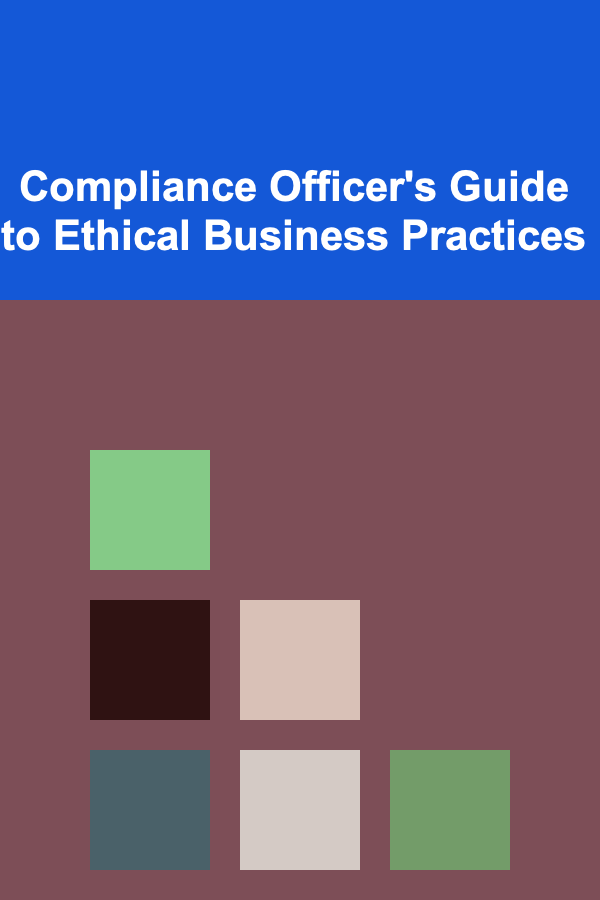
Compliance Officer's Guide to Ethical Business Practices
ebook include PDF & Audio bundle (Micro Guide)
$12.99$6.99
Limited Time Offer! Order within the next:

In the modern business landscape, the role of a compliance officer is not merely about ensuring that an organization adheres to laws and regulations. It is also about creating a culture of ethical conduct, fostering transparency, and protecting the integrity of the business. Compliance officers are essential to navigating the increasingly complex and dynamic environment of ethical business practices, which is paramount in maintaining a company's reputation, safeguarding stakeholders, and avoiding legal liabilities.
This guide will provide actionable steps and insights to help compliance officers implement ethical business practices within their organization. From creating a robust compliance program to dealing with ethical dilemmas, this resource will help compliance professionals not only follow the rules but actively foster a culture of ethics and integrity.
Building a Strong Ethical Framework
The foundation of an ethical business practice is a well-defined and clear ethical framework. As a compliance officer, your first task is to ensure that your organization has a strong ethical code that aligns with its values, mission, and vision.
Actionable Steps:
- Create a Code of Ethics: Your organization's code of ethics should set clear expectations for employee behavior. This should address issues such as honesty, fairness, confidentiality, conflicts of interest, and respect. Ensure that it is written in clear, accessible language.
- Engage Leadership in Ethics: It is essential that leadership leads by example. Senior leaders should not only promote ethical behavior but also demonstrate it in their day-to-day actions. This creates a trickle-down effect that influences the entire organization.
- Customize Ethics Policies for Different Departments: Different departments may face unique ethical challenges. For example, marketing may deal with advertising truthfulness, while finance may be concerned with financial reporting accuracy. Customize ethics policies to address these challenges, while keeping the core principles intact.
Implementing a Robust Compliance Program
A robust compliance program is necessary to ensure that ethical standards are met consistently across the organization. As a compliance officer, it is your job to implement and oversee this program, which should include monitoring, training, reporting, and enforcement mechanisms.
Actionable Steps:
- Establish Clear Compliance Procedures: Clearly define what constitutes ethical behavior in your organization and set guidelines on how to report violations. Procedures should include regular audits, risk assessments, and internal controls to detect and prevent violations.
- Conduct Regular Training and Awareness Programs: Ensure that employees at all levels understand the organization's ethical standards. Offer regular, mandatory training sessions on compliance issues such as anti-corruption laws, data privacy, and financial integrity.
- Create a Whistleblower System: Establish a confidential and secure process for employees to report unethical behavior. This system should protect whistleblowers from retaliation and ensure that any reported issue is thoroughly investigated.
- Monitor Compliance Through Audits: Regularly audit both high-risk areas and routine processes to ensure compliance with the ethical standards. This should involve not only reviewing financial records but also evaluating business practices, supply chain integrity, and third-party relationships.
Identifying and Managing Ethical Risks
Every business faces ethical risks that can impact its reputation and bottom line. As a compliance officer, it is crucial to proactively identify these risks and take steps to mitigate them before they evolve into significant issues.
Actionable Steps:
- Conduct a Risk Assessment: Regularly assess your business for ethical risks by identifying areas where the organization is most vulnerable. This may include evaluating relationships with suppliers, distributors, or clients, where corruption, fraud, or conflicts of interest may arise.
- Evaluate Third-Party Relationships: Third-party risks, such as vendor or contractor relationships, can be a source of significant ethical concerns. Implement due diligence procedures for selecting partners and monitor their practices to ensure they adhere to your organization's ethical standards.
- Assess Cultural and Regulatory Risks: Businesses operating in multiple regions or countries must be aware of local cultural practices and legal requirements that might clash with corporate ethical standards. Ensure that your compliance program is flexible enough to address these differences.
- Mitigate Risk Through Policies and Procedures: Implement policies that help mitigate identified risks. For example, if bribery or corruption is a concern in a specific region, set up clear anti-bribery policies and practices for employees and contractors in that area.
Fostering a Culture of Integrity
Beyond merely ensuring compliance with laws, a compliance officer must also work to create an ethical culture that encourages employees to act with integrity and uphold the organization's values.
Actionable Steps:
- Promote Open Dialogue: Encourage employees to discuss ethical issues openly with leadership and their peers. Hold town hall meetings, workshops, and feedback sessions that provide employees the opportunity to voice concerns and ask questions related to ethical issues.
- Recognize Ethical Behavior: Acknowledge and reward employees who demonstrate exemplary ethical conduct. This will reinforce the importance of ethics in your organization and motivate others to follow suit.
- Incorporate Ethics into Performance Reviews: Make ethical behavior a factor in performance evaluations. This ensures that ethical standards are not just an afterthought but an integral part of how employees are assessed and rewarded.
- Provide Ongoing Support: Ethics should be integrated into all aspects of employee training and development. Make sure that employees know where to go for ethical guidance and that there are always resources available to assist them in making difficult decisions.
Addressing and Resolving Ethical Dilemmas
Even with a strong compliance program in place, ethical dilemmas are inevitable. These challenges may come in many forms, such as conflicts of interest, pressure to cut corners, or navigating ambiguous situations where the right course of action isn't immediately clear. The ability to navigate these dilemmas is an essential skill for any compliance officer.
Actionable Steps:
- Develop a Decision-Making Framework: Equip employees with tools to navigate ethical dilemmas by creating a decision-making framework. This framework should encourage employees to ask questions such as: "Does this align with our company's values? Are there potential consequences for stakeholders? Is this in line with the law?"
- Consult Stakeholders: When faced with difficult ethical decisions, it is often helpful to involve other stakeholders, including legal counsel, HR, and senior leadership, to ensure that decisions are made with a holistic perspective.
- Ensure Transparency in Resolving Issues: When ethical violations occur, address them transparently. Clearly communicate the steps taken to resolve the issue and prevent future occurrences. Transparency fosters trust and shows the organization's commitment to ethical conduct.
Ethical Leadership in the Age of Technology and Data
The rise of digital technology and data-driven decision-making has brought new challenges to the world of compliance. Data privacy, cybersecurity, and the ethical use of technology must be part of any modern compliance officer's remit.
Actionable Steps:
- Implement Strong Data Protection Measures: Ensure that your organization is in compliance with data privacy regulations like GDPR, CCPA, and others. Regularly audit data usage to ensure that personal data is protected and handled in an ethical manner.
- Promote Ethical Use of AI and Automation: As businesses increasingly rely on AI and automation, it is essential that these technologies are used ethically. Ensure that algorithms are transparent, avoid bias, and are implemented in a way that promotes fairness.
- Educate Employees on Cybersecurity: Cybersecurity is a critical component of ethical business practices. Educate employees on how to protect company data, avoid phishing schemes, and maintain secure communication channels.
Legal and Regulatory Compliance: A Non-Negotiable
While ethical behavior goes beyond mere compliance, adherence to relevant laws and regulations is non-negotiable. Compliance officers must ensure that their organization is meeting all legal requirements, both domestically and internationally.
Actionable Steps:
- Stay Up to Date with Laws and Regulations: Laws change frequently, and staying informed about changes to both domestic and international laws is vital. Subscribe to relevant legal updates and participate in compliance forums to remain current.
- Engage Legal Counsel for Complex Issues: For complex regulatory matters, it is essential to consult with legal professionals who specialize in specific areas, such as labor laws, anti-corruption regulations, or industry-specific compliance standards.
- Regularly Update Compliance Policies: As laws evolve, so should your compliance policies. Regularly review and update your compliance program to ensure that it aligns with current legal requirements.
The Importance of Continuous Improvement
A successful compliance program is never static. It should evolve as the business landscape changes and new ethical challenges arise. Continuous improvement is key to maintaining an effective and adaptive program that keeps pace with industry best practices.
Actionable Steps:
- Solicit Feedback: Regularly ask for feedback from employees and stakeholders to identify areas where the compliance program can be improved. Use surveys, focus groups, and anonymous feedback tools to get a comprehensive view.
- Conduct Internal Audits and Assessments: Continuously assess the effectiveness of your compliance program through internal audits and performance reviews. Identify weak spots and make the necessary improvements.
- Stay Educated: As a compliance officer, it is crucial to keep learning. Attend compliance training, participate in industry conferences, and network with other compliance professionals to stay ahead of trends and challenges.
Conclusion
Being a compliance officer is no longer just about preventing violations; it's about fostering an ethical culture that supports transparency, accountability, and integrity. By implementing a strong ethical framework, proactively managing risks, addressing dilemmas, and continuously improving the compliance program, you can position your organization as a leader in ethical business practices.
Ethical business practices are not a luxury but a necessity in today's competitive and increasingly regulated world. As a compliance officer, you have the power to shape the ethical foundation of your organization, ensuring that it not only meets regulatory standards but also acts in a way that positively impacts society and the environment.

How to Create a Checklist for Implementing Secure Payment Gateways on Your Website
Read More
How to Keep Your Home Organized with Smart Under-Stair Storage Ideas
Read More
How to Reduce Pet Odors in Your Home
Read More
How to Tackle Bedroom Clutter in 10 Minutes a Day
Read More
How to Turn Your Travel Blog into a Photography Business
Read More
How to Understand News in a Foreign Language
Read MoreOther Products

How to Create a Checklist for Implementing Secure Payment Gateways on Your Website
Read More
How to Keep Your Home Organized with Smart Under-Stair Storage Ideas
Read More
How to Reduce Pet Odors in Your Home
Read More
How to Tackle Bedroom Clutter in 10 Minutes a Day
Read More
How to Turn Your Travel Blog into a Photography Business
Read More